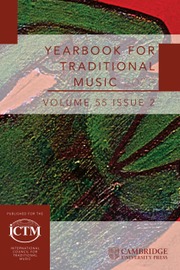Article contents
The Politics of Passion: The Impact of Bolero on Brazilian Musical Expressions
Published online by Cambridge University Press: 07 March 2019
Extract
Scholars who study world musics as fields of meaning formation have been devoting a great deal of attention to a historical phenomenon that, although not exactly new, is exerting a relatively greater impact on world cultures at the end of the century. The term globalization has been used to express this unprecedented movement of capital concentration on a worldwide scale, diminishing or at least redefining the role of nation-states as traditional centers of power and decision-making. This phenomenon has conditioned the restructuring of economic, political, and cultural relations among human groups (nation-states, social classes, ethnic groups, urban sub-cultures, etc.) worldwide (Ianni 1992). Making it possible to think of space and time in new terms, globalization has immersed those groups in various types of virtual interaction, something that many of their own musical practices had experienced since the growth of mass reproduction technologies. In such context, several of the social sciences’ more influential concepts (culture, class, national state, etc.) have been challenged to reaffirm their relevance (Ianni 1992).
- Type
- Articles
- Information
- Copyright
- Copyright © 1999 by the International Council for Traditional Music
Footnotes
To Pedro Santos, philosopher-musician, in memoriam.
References
References Cited
- 3
- Cited by


